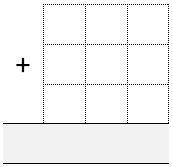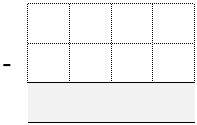In Maths this week we have been looking at the written methods for addition and subtraction. We will be continuing this next week and then moving on to multiplication and division.
Our school calculation policy can be found here:
https://drive.google.com/file/d/0B1F37T8TVQJWNXBybkRKWEFZNkE/view
You can support your child at home by following our calculation method and playing a game that the children have been playing in class this week called dicey operations: (More ideas are available on the Nrich website)
Take turns to throw the dice and decide which of your cells to fill.
This can be done in two ways: either fill in each cell as you throw the dice, or collect all your numbers and then decide where to place them.
Game 1
Each of you draw an addition grid like this:

Throw the dice nine times each until all the cells are full.
Whoever has the sum closest to 1000 wins.
There are two possible scoring systems:
- A point for a win. The first person to reach 10 wins the game.
- Each player keeps a running total of their "penalty points", the difference between their result and 1000 after each round. First to 5000 loses.
You can vary the target to make it easier or more difficult.
Game 2
Each of you draw a subtraction grid like this:

Throw the dice eight times each until all the cells are full.
Whoever has the difference closest to 1000 wins.
There are two possible scoring systems:
- A point for a win. The first person to reach 10 wins the game.
- Each player keeps a running total of their "penalty points", the difference between their result and 1000 after each round. First to 5000 loses.
You can vary the target to make it easier or more difficult, perhaps including negative numbers as your target.
If you do not have dice at home, there are apps that can generate numbers such as 'Dice Roll' available on apple and android devices.
In English this week we have been looking at information texts and learning about tanks that were first used in WW1. Next week we will be continuing this and the children will be writing their own information text.
Homework this week:
English Y5 26-27 Y6 16-17
Maths Y5 12-13 Y6 7

